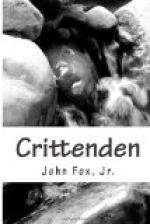On the top of a low hill, a wind from the dawn struck him, and the paper in the bottom of the buggy began to snap against the dashboard. He reached down to keep it from being whisked into the road, and he saw again that Judith Page had come home. When he sat up again, his face was quite changed. His head fell a little forward, his shoulders drooped slightly and, for a moment, his buoyancy was gone. The corners of the mouth showed a settled melancholy where before was sunny humour. The eyes, which were dreamy, kindly, gray, looked backward in a morbid glow of concentration; and over the rather reckless cast of his features, lay at once the shadow of suffering and the light of a great tenderness. Slowly, a little hardness came into his eyes and a little bitterness about his mouth. His upper lip curved in upon his teeth with self-scorn—for he had had little cause to be pleased with himself while Judith was gone, and his eyes showed now how proud was the scorn—and he shook himself sharply and sat upright. He had forgotten again. That part of his life belonged to the past and, like the past, was gone, and was not to come back again. The present had life and hope now, and the purpose born that day from five blank years was like the sudden birth of a flower in a desert.
The sun had burst from the horizon now and was shining through the tops of the trees in the lovely woodland into which Crittenden turned, and through which a road of brown creek-sand ran to the pasture beyond and through that to the long avenue of locusts, up which the noble portico of his old homestead, Canewood, was visible among cedars and firs and old forest trees. His mother was not up yet—the shutters of her window were still closed—but the servants were astir and busy. He could see men and plough-horses on their way to the fields; and, that far away, he could hear the sound of old Ephraim’s axe at the woodpile, the noises around the barn and cowpens, and old Aunt Keziah singing a hymn in the kitchen, the old wailing cry of the mother-slave.
“Oh I wonder whur my baby’s
done gone,
Oh Lawd!
An’ I git on my knees an’ pray.”
The song stopped, a negro boy sprang out the kitchen-door and ran for the stiles—a tall, strong, and very black boy with a dancing eye, white teeth, and a look of welcome that was little short of dumb idolatry.
“Howdy, Bob.”
“Howdy, Ole Cap’n.” Crittenden had been “Ole Captain” with the servants—since the death of “Ole Master,” his father—to distinguish him from “Young Captain,” who was his brother, Basil. Master and servant shook hands and Bob’s teeth flashed.
“What’s the matter, Bob?”
Bob climbed into the buggy.
“You gwine to de wah.”
Crittenden laughed.
“How do you know, Bob?”
“Oh, I know—I know. I seed it when you was drivin’ up to de stiles, an’ lemme tell you, Ole Cap’n.” The horse started for the barn suddenly and Bob took a wide circuit in order to catch the eye of a brown milkmaid in the cowpens, who sniffed the air scornfully, to show that she did not see him, and buried the waves of her black hair into the silken sides of a young Jersey.




